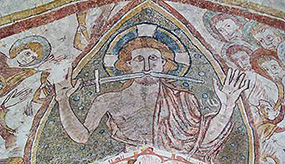One of the things that saddens me most about where we are in America at this stage in history is our inability to repent. And one of the reasons Americans are such strangers to repentance is that I don’t think we know what it is anymore.
I could quote a lot of Bible verses here, but if you want to find out more about repentance, do the due diligence and study it yourself. I’m just going to share what I know and keep it all simple.
And the simplest truth about repentance is that it’s turning back to God.
Notice that there’s nothing really added to that. I didn’t even mention sin.
The reason I didn’t mention bad things that you do is because sin isn’t really bad things that you do. Sin is what you are. Sin exists on the level of atoms, and DNA, and all those tiny bits that make up you, even bits that abide in the world of the spiritual. And for that reason, it’s why all the silly things religious people do to try to get rid of bad things inside themselves are such a fool’s errand.
OK, so I lied a little about Bible verses here. I’m going to reference Jesus’ story of the Prodigal Son. Most people know the story, but if you don’t, it will be at the end of this post. I paraphrase below to get us thinking the same way…
A son came to his father and said, “I wish you were dead.” Because that was how he now viewed his father, the son demanded his father act as if he were dead, which meant the son demanded the still-living father hand over inheritance money. The father complied. And because the son was driven by the stupidity of sin down to the atomic level, he stayed true to that nature and did stupid, sinful things that took him to stupid, sinful places inhabited by stupid, sinful people. In short order, the money ran out, and the son took a lousy job in a lousy place and generally felt lousy.
In time, he missed his father. So the son left that place of stupidity and stumbled home, where his father was waiting for him with open arms. No lecture from the father, no recap of bad choices, just love.
I leave some of the details of that story to the theologians and preachers, but the key point of the story is not all the hooker-boinking and booze-hounding the son did on his inheritance spending spree. All the son was doing was being true to his nature, to that atomic level of sin that no one can deal with on his own because it’s always at work and permeates everything. The point of the story is that the son went back home to a father who loved him.
 The history of God throughout the Bible is of a father waiting at home for prodigals to come back to Him. The Bible starts with man wandering off and ends with man being at home with God forever.
The history of God throughout the Bible is of a father waiting at home for prodigals to come back to Him. The Bible starts with man wandering off and ends with man being at home with God forever.
In the prodigal’s story, the son didn’t try to mask his stupidity or somehow make amends for it. He just went back home. The father can deal with the stupidity and the filth. In reality, God does that through Jesus, who became sin on our behalf and dealt it a deathblow on the cross. The point is that the father knows the sin is there. He deals with it. All he wants is the wanderer to be home with him.
God throughout the Bible waits at home and calls stupid people, those infested with sin down to their cores—in short, everyone—to come back to Him. And when they do turn around and head back, it’s not to a household where the father has kept track of every stupid thing the prodigal has done, because the father isn’t interested in keeping a record of stupidity. No, the father is simply glad the wanderer is home.
And chances are, because prodigality is ingrained in humanity to the atomic level, that wanderer will likely go wandering again. But the father is steadfast, and he’ll be there at home with open arms. Because sometimes the truth about the father must be learned again and again. Fact is, in time, the wanderings do lessen. Maybe not to the point of going away entirely, but learning that the best is with the father begins to sink in over the course of a lifetime.
The sad reality about the story of the prodigal son is that a lot of prodigals out there prefer feeling lousy doing the lousy job in the lousy place to being at home with the father. They haven’t woken up yet and may never do so. They tend to be people whose point of reference doesn’t extend beyond their nose. For them, home and the father are two concepts that are a long way off in a faraway land, and they stay that way.
Hell isn’t filled with every person tainted by sin at the atomic level. It’s filled with people who don’t want to be where the Father is. They said to Him, “I wish you were dead,” and they left it at that. In a way, they found their hellaciously alien “home” away from home and made it permanent. They never came back to their real home from their place in that far-off land. They never came back to the father awaiting them with open arms.
I could go into all sorts of theological depth here, but in truth, we can bury this story under heaps of analysis and miss the main point that all repentance is is going back home to where God abides. All God wants is an intimate relationship with people, people who will retain that taint of sin on them this side of eternity. All He wants is to be with you. His arms are wide open.
Come home.
And [Jesus] said, “There was a man who had two sons. And the younger of them said to his father, ‘Father, give me the share of property that is coming to me.’ And he divided his property between them. Not many days later, the younger son gathered all he had and took a journey into a far country, and there he squandered his property in reckless living. And when he had spent everything, a severe famine arose in that country, and he began to be in need. So he went and hired himself out to one of the citizens of that country, who sent him into his fields to feed pigs. And he was longing to be fed with the pods that the pigs ate, and no one gave him anything.
“But when he came to himself, he said, ‘How many of my father’s hired servants have more than enough bread, but I perish here with hunger! I will arise and go to my father, and I will say to him, Father, I have sinned against heaven and before you. I am no longer worthy to be called your son. Treat me as one of your hired servants.’ And he arose and came to his father. But while he was still a long way off, his father saw him and felt compassion, and ran and embraced him and kissed him. And the son said to him, ‘Father, I have sinned against heaven and before you. I am no longer worthy to be called your son.’ But the father said to his servants, ‘Bring quickly the best robe, and put it on him, and put a ring on his hand, and shoes on his feet. And bring the fattened calf and kill it, and let us eat and celebrate. For this my son was dead, and is alive again; he was lost, and is found.’ And they began to celebrate.
“Now his older son was in the field, and as he came and drew near to the house, he heard music and dancing. And he called one of the servants and asked what these things meant. And he said to him, ‘Your brother has come, and your father has killed the fattened calf, because he has received him back safe and sound.’ But he was angry and refused to go in. His father came out and entreated him, but he answered his father, ‘Look, these many years I have served you, and I never disobeyed your command, yet you never gave me a young goat, that I might celebrate with my friends. But when this son of yours came, who has devoured your property with prostitutes, you killed the fattened calf for him!’ And he said to him, ‘Son, you are always with me, and all that is mine is yours. It was fitting to celebrate and be glad, for this your brother was dead, and is alive; he was lost, and is found.’”
— Luke 15:11-32

 In summary: Love God and love your neighbor—and don’t badly judge your neighbor, either.
In summary: Love God and love your neighbor—and don’t badly judge your neighbor, either. I hear a lot of laments online about why America is in trouble as a nation. There’s a reason for that trouble, a remarkably simple one. It’s found in this verse of the Bible:
I hear a lot of laments online about why America is in trouble as a nation. There’s a reason for that trouble, a remarkably simple one. It’s found in this verse of the Bible: